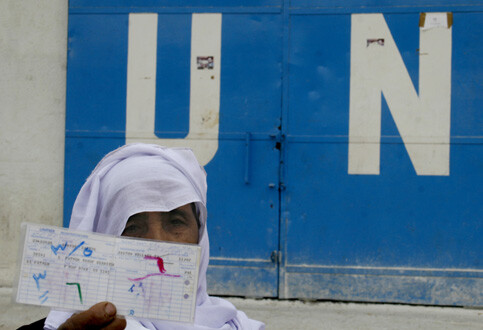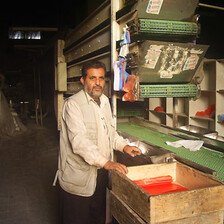Gaza Strip 25 December 2008

The UN agency for Palestine refugees, UNRWA, has been forced to stop food aid delivery to 750,000 refugees in the occupied Gaza Strip. (Hatem Omar/MaanImages)
The Gaza Strip, home to more than 1.5 million Palestinians, will soon be without its most basic commodity: bread. While families around the world celebrate Christmas, gathering around tables of abundance, Gaza parents like me will not even be able provide bread for their children unless Israel opens the commercial crossings to Gaza from the outside world.
Yesterday, after I finished my lecture at one of Gaza’s universities, my wife asked me to bring some bread from Gaza City. All bakeries in our area have stopped operating because of the lack of flour and cooking gas due to Israel’s 18-month siege of the territory.
I drove throughout Gaza City to try to find some bread for my four children, instead finding a miserable scene. On the drive back to my home in the Maghazi refugee camp in the central Gaza Strip, I saw dozens of people lining up in rows to get bread from al-Yazji Bakery. I quickly realized that it would take one or two hours until it would be my turn in line, by which time I might not find bread at all. So I continued my drive back to Maghazi, without bread.
“Father, we want to eat, we don’t have bread,” my eldest daughter complained. I paused and then thought to ask my son Munir to bring some felafel sandwiches — our answer to fast food — so we can quickly fill our empty stomachs. Fortunately, after a while Munir returned carrying sandwiches bought at an inflated price.
While we were eating, my wife asked me to drive early to Gaza City the next day so we might buy some bread. Imagine that today in Gaza, acquiring a simple package of bread requires getting up at daybreak, purchasing a gallon of expensive gas because it is smuggled in from Egypt, and that it will take two or three hours to complete the task! Of course, my family’s story is not special. It is the story of all families in Gaza who are trying to survive a deliberate humanitarian crisis created by Israel.
According to Abdel Naser al-Ajrami, head of the bakers association in Gaza, more than 27 bakeries out of a total of 47 in Gaza City have been shut down completely due to a lack of cooking gas and wheat, as Israel has sealed the commercial border crossings for almost two months now. Al-Ajrami explained yesterday that sufficient quantities will be distributed to bakeries in the next three days, adding that there have been relentless efforts by officials of the ruling Hamas government to ensure that the necessary amounts cooking gas and wheat are supplied throughout Gaza.
On 18 December, the UN Agency for Palestinian refugees (UNRWA) halted food distribution to 750,000 refugees in Gaza, including my family, because their stocks of wheat flour have run out. According to the United Nations Office for the Coordination of Humanitarian Affairs (OCHA), Israel is only allowing 16 truckloads of goods to enter Gaza per day. In contrast, 475 trucks per day entered the Strip in May 2007 when the militia loyal to Hamas took control of the Gaza Strip amidst factional fighting with forces loyal to the Fatah party of Palestinian Authority President Mahmoud Abbas.
As the new year approaches, it is unclear what is in store for Gaza as a six-month ceasefire between Israel and Palestinian resistance groups ended earlier this week. In response to the closure and the extrajudicial killing of Palestinians by Israeli forces, resistance groups in Gaza have renewed the firing of crude rockets into southern Israel. As Israel gears up for an election, the fate of families like mine becomes a matter of political rhetoric, each candidate trying to outdo the other in its promises to do harm to our lives. Gaza remains the world’s largest open-air prison. However, unlike other prisons, the inmates are allowed to go hungry. Meanwhile, the Israeli warden goes unpunished by the United States and the European Union for its cruelty.
Rami Almeghari is contributor to The Electronic Intifada, IMEMC.org and Free Speech Radio News. Rami is also a former senior English translator at and editor-in-chief of the international press center of the Gaza-based Palestinian Information Service and a part-time lecturer on media and political translation at the Islamic University of Gaza. He can be contacted at rami_almeghari A T hotmail D O T com.
Related Links





